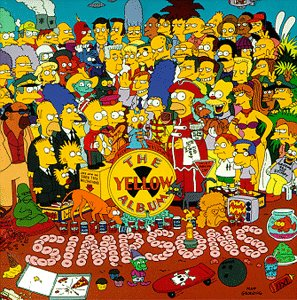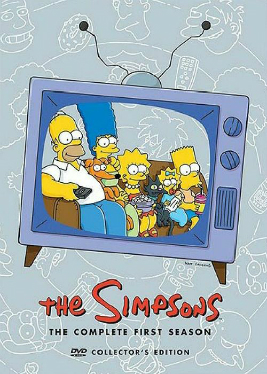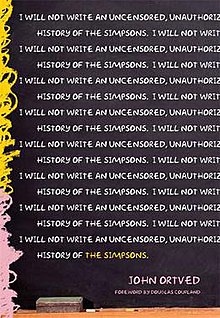
Matthew Abram Groening is an American cartoonist, writer, producer, and animator. He is best known as the creator of the television series The Simpsons (1989–present), Futurama, and Disenchantment (2018–2023), and the comic strip Life in Hell (1977–2012). The Simpsons is the longest-running U.S. primetime television series in history and the longest-running U.S. animated series and sitcom.

The Simpsons is an American animated sitcom created by Matt Groening for the Fox Broadcasting Company. Developed by Groening, James L. Brooks, and Sam Simon, the series is a satirical depiction of American life, epitomized by the Simpson family, which consists of Homer, Marge, Bart, Lisa, and Maggie. Set in the fictional town of Springfield, it caricatures society, Western culture, television, and the human condition.

Barnard "Barney" Gumble is a recurring character in the American animated TV series The Simpsons. He is voiced by Dan Castellaneta and first appeared in the series premiere episode "Simpsons Roasting on an Open Fire".

David Mirkin is an American feature film and television director, writer and producer. Mirkin grew up in Philadelphia and intended to become an electrical engineer, but abandoned this career path in favor of studying film at Loyola Marymount University. After graduating, he became a stand-up comedian, and then moved into television writing. He wrote for the sitcoms Three's Company, It's Garry Shandling's Show and The Larry Sanders Show and served as showrunner on the series Newhart. After an unsuccessful attempt to remake the British series The Young Ones, Mirkin created Get a Life in 1990. The series starred comedian Chris Elliott and ran for two seasons, despite a lack of support from many Fox network executives, who disliked the show's dark and surreal humor. He moved on to create the sketch show The Edge starring his then-partner, actress Julie Brown.

James Lawrence Brooks is an American director, producer, screenwriter and co-founder of Gracie Films. He co-created the sitcoms The Mary Tyler Moore Show, Taxi, and The Simpsons and directed the films Terms of Endearment (1983), Broadcast News (1987), and As Good as It Gets (1997). He received numerous accolades including three Academy Awards, 22 Emmy Awards, and a Golden Globe Award.

Life in Hell is a comic strip by Matt Groening that was published weekly from 1977 to 2012. Its main characters include anthropomorphic rabbits and a gay couple. The comic covers a wide range of subjects, such as love, sex, work, and death, and explores themes of angst, social alienation, self-loathing, and fear of inevitable doom. The Simpsons began development as an animated adaptation for a segment of The Tracey Ullman Show, before Groening decided to adapt his character archetypes as original characters to avoid a loss of ownership rights to publish Life in Hell.

The Simpsons Sing the Blues is the first album released as an offshoot of The Simpsons. The album contains originally recorded music not featured in the series save for the first verse of the track "Moaning Lisa Blues" which was first featured in the episode "Moaning Lisa", which aired in the United States on February 11, 1990. The album was released on December 4, 1990, and peaked at No. 3 on the Billboard 200.

The Tracey Ullman Show is an American television sketch comedy variety show starring Tracey Ullman. It debuted on Fox on April 5, 1987, as the network's second original primetime series to air, following Married... with Children, and ran for four seasons and 81 episodes until May 26, 1990. It was produced by Gracie Films in association with 20th Century Fox Television. The show blended sketch comedy with musical numbers and dance routines, choreographed by Paula Abdul, along with animated shorts. The format was conceived by co-creator and executive producer James L. Brooks, who was looking to showcase the show's multitalented star. Brooks likened the show to producing three pilots a week. Ullman was the first British woman to be offered her own television sketch show in the United States.

Alfred Ernest Jean III is an American screenwriter and producer. Jean is well known for his work on The Simpsons. He was raised near Detroit, Michigan, and graduated from Harvard University in 1981. Jean began his writing career in the 1980s with fellow Harvard alum Mike Reiss. Together, they worked as writers and producers on television shows such as The Tonight Show Starring Johnny Carson, ALF and It's Garry Shandling's Show.

The Yellow Album is The Simpsons' second album of originally recorded songs, released as a follow-up to the 1990 album The Simpsons Sing the Blues. Though it was released in 1998, it had been recorded years earlier, after the success of the first album. The title is a play on the name of the Beatles' self-titled 1968 album, commonly known as "The White Album", with the skin color of the characters of The Simpsons. In addition, the cover is a parody of the Beatles' 1967 album Sgt. Pepper's Lonely Hearts Club Band.
"Simpson and Delilah" is the second episode of the second season of the American animated television series The Simpsons. It originally aired on Fox in the United States on October 18, 1990. In the episode, Homer uses the Springfield Nuclear Power Plant's medical insurance plan to buy Dimoxinil, a miracle hair growth formula. When Homer's bald head sprouts a full mane of hair, he is promoted at work and hires a secretary named Karl. The episode was written by Jon Vitti and directed by Rich Moore, and guest starred Harvey Fierstein as Karl.
"I Am Furious (Yellow)" is the eighteenth episode of the thirteenth season of the American animated television series The Simpsons. It first aired in the United States by the Fox network on April 28, 2002. In the episode, Bart creates a comic book series based on his father Homer's anger problems, which turns into a popular Internet cartoon series called Angry Dad. Homer finds out and at first is outraged, but after talking to his family, decides to try to become a less angry person.

Samuel Michael Simon was an American television producer and animal rights activist who co-developed the television series The Simpsons.

The first season of the American animated television series The Simpsons premiered on the Fox network on December 17, 1989, with the Christmas special "Simpsons Roasting on an Open Fire", with the rest of the season airing from January 14 to May 13, 1990. The executive producers for the first production season were Matt Groening, James L. Brooks, and Sam Simon. It was produced by Gracie Films and 20th Century Fox Television.

The fourth season of the American animated television series The Simpsons originally aired on the Fox network between September 24, 1992, and May 13, 1993, beginning with "Kamp Krusty". The showrunners for the fourth production season were Al Jean and Mike Reiss, with the season being produced by Gracie Films and 20th Century Fox Television. The aired season contained two episodes which were hold-over episodes from season three, which Jean and Reiss also ran. Following the end of the production of the season, Jean, Reiss and most of the original writing staff left the show. The season was nominated for two Primetime Emmy Awards and Dan Castellaneta would win one for his performance as Homer in "Mr. Plow". The fourth season was released on DVD in Region 1 on June 15, 2004, Region 2 on August 2, 2004, and in Region 4 on August 25, 2004.

The Simpsons is an American animated television sitcom starring the animated Simpson family, which was created by Matt Groening. He conceived of the characters in the lobby of James L. Brooks's office and named them after his own family members, substituting "Bart" for his own name. The family debuted as shorts on The Tracey Ullman Show on April 19, 1987. After a three-season run, the sketch was developed into a half-hour prime time show called The Simpsons, which debuted on December 17, 1989. The show was an early hit for Fox, becoming the first Fox series to land in the top 30 ratings in a season (1990).

The Simpsons is an American animated television sitcom created by Matt Groening that has aired on the Fox Broadcasting Company since December 1989. It is a satirical parody of a middle class American lifestyle epitomized by its eponymous family, which consists of Homer, Marge, Bart, Lisa and Maggie. The show is set in the fictional town of Springfield, and lampoons American culture, society, and many aspects of the human condition. The popularity of The Simpsons led to the release of the 1990 double platinum album The Simpsons Sing the Blues, which contains original songs performed by the cast members of the show as their characters. The album spawned two hit singles—"Do the Bartman" and "Deep, Deep Trouble". A less successful sequel, The Yellow Album, was released in 1998.
Mary Marr "Polly" Platt was an American film producer, production designer and screenwriter. She was the first woman accepted into the Art Directors Guild, in 1971. In addition to her credited work, she was known as a mentor as well as an uncredited collaborator and networker. In the case of the latter, she is credited with contributing to the success of ex-husband and director Peter Bogdanovich's early films; mentoring then first-time director and writer Cameron Crowe, and discovering actors including Cybill Shepherd, Tatum O'Neal, Owen Wilson, Luke Wilson, and director Wes Anderson. Platt also suggested that director James L. Brooks meet artist and illustrator Matt Groening, which eventually resulted in the satiric animated television series The Simpsons.

The Simpsons is an American animated comedy franchise whose eponymous family consists of Homer, Marge, Bart, Lisa, and Maggie. The Simpsons were created by cartoonist Matt Groening for a series of animated shorts that debuted on The Tracey Ullman Show on Fox on April 19, 1987. After a three-season run, the sketch was developed into The Simpsons, a half-hour prime time show that was an early hit for Fox, becoming the first Fox series to land in the Top 30 ratings in a season (1989–1990). The popularity of The Simpsons has made it a billion-dollar merchandising and media franchise. Alongside the television series, the characters of the show have been featured in a variety of media, including books, comic books, a magazine, musical releases, and video games.
The Simpsons is an American animated sitcom which premiered on Fox on December 17, 1989. Having finished its 35th season in 2024, critical commentary on the show has changed significantly over its run. The Simpsons' golden era is widely considered to be among the most influential media ever produced. Discussion of the show following the supposed "end of the golden era" has been related to the decline in quality, the causes of that change, and possible solutions.














